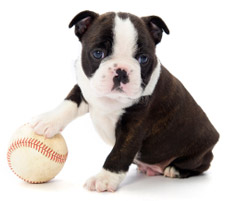|
|||||
|
|
SignsIt is highly recommended to spay and neuter all animals that are not intended for breeding. In female dogs, spaying prevents heat cycles from occurring approximately every 5 months, and if performed before the first or second heat cycle, lowers the chance of mammary cancer. Spaying also prevents pyometra (a life-threatening uterine infection) and, most importantly, pregnancy and unwanted or poorly bred puppies. We recommend spaying females at about 5-6 months of age. Males should be neutered to prevent unwanted pregnancies and to lower the likelihood of prostate problems. Further, neutering inhibits the urge to run away in search of females and helps you avoid some behavioral issues, such as aggression and/or dominance. |
 |
Feeding
Your puppy will do well on two feedings a day (feeding three times a day is not necessary, but is OK if the puppy is under 16 weeks of age). Occasionally, some of the toy breeds need to be fed numerous small meals throughout the day, due to a low blood sugar condition. Your veterinarian will advise you if your puppy needs to eat more frequently. Adult dog food contains all the nutrients that puppies and adult dogs need. You may feed your small breed puppy either adult or puppy dry food, if you wish. Large breed puppies should eat large breed puppy food or adult food to help avoid developmental bone diseases.You may feed the food dry or you can dampen it with warm water. A very young puppy may need its kibble softened, but older pups can eat crunchy food. Your puppy should eat quickly and act slightly hungry when it is finished. A puppy should take no longer than 10 minutes to finish a meal. Most will finish the meal in a minute or so. If your puppy takes longer, or if it walks away while there is still food in the bowl, then you are probably feeding too much food.
| Quick Links | |||||
| Home About us Our Staff |
Our Services Contact us |
Cat Health Cat Skin Problems Cat Vaccinations |
Kitten Care Dog Health Dog Skin Problems |
Dog Vaccinations Puppy Care Pet Dental |
Spaying & Neutering Other Resources Request an Appointment |
| Copyright © 2011-2012 Beddington Trail Animal Hospital. All Rights Reserved. | |||||
